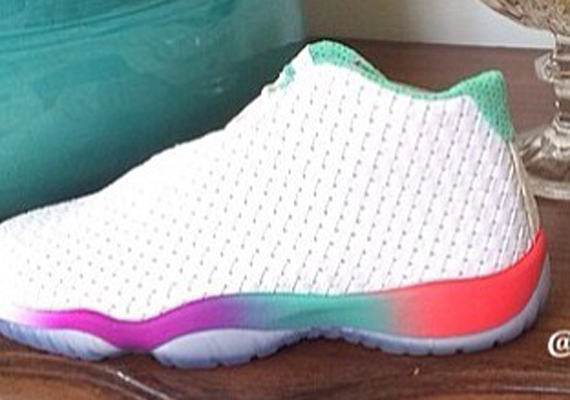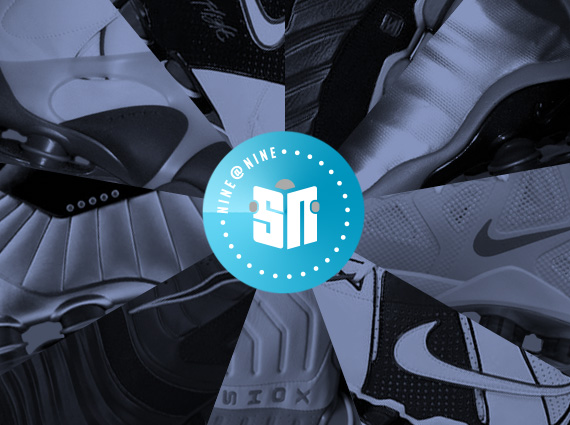
Nike basketball was in a strange place in the mid-2000s. Today the brand dominates the hoops scene thanks to inking contracts with a trio of the most marketable players on the planet in LeBron, Kobe, and Kevin Durant, but there was a time in the not-so-distant past when Vince Carter resided on the top of the Nike mountain. That could’ve been due to a number of variables – his high flying marketability after the 2000 Dunk Contest and a post-Jordan basketball landscape that was desperately looking for its next star to emerge. The list of potential signature stars was seemingly endless, but one thing was for certain – the sneaker was going to include Nike Shox technology.
The unique, almost alien tech advancement has been missing in action for the most part in regards to courtside models today, but for almost a decade Nike championed the feature until blowing it off for a preferred Air Max or Zoom base. Be sure to stick with us after the click to get the latest NINE@NINE rundown of 9 Nike Shox basketball models that helped expand the reach of the famed Swoosh technology and be sure to check out the latest addition to the Shox family, the Shox TLX Mid SP.
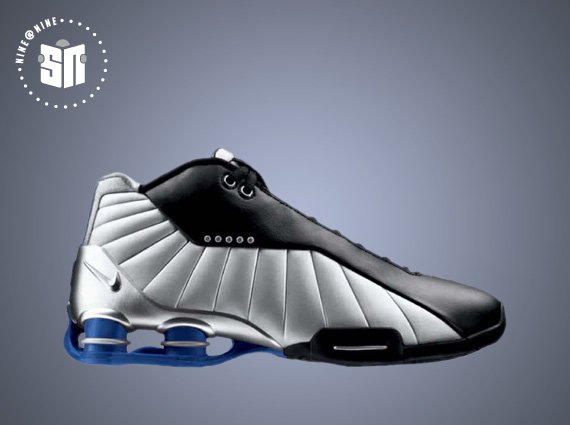
2000 – Nike Shox BB4
You remember the dunk. The United States had yet to flounder in international play in the year 2000, Nike Basketball was a few years from taking control of USAB as they were still sponsored by Champion, and with a line-up boasting the likes of Kevin Garnett, Ray Allen, and Vince Carter, the opposition was hard pressed to compete. With its space-aged concept and rocket-booster aesthetic, the Nike Shox BB4 was enough to stand on its own, but it was VC’s explosive lift-off over the 7-foot Frenchman that deaded any of Weis’s NBA hopes and solidified this Shox release as a coveted pick up for anyone dreaming of posterizing a defender. It would go on to be the most popular of Shox Basketball line, and for good reason.
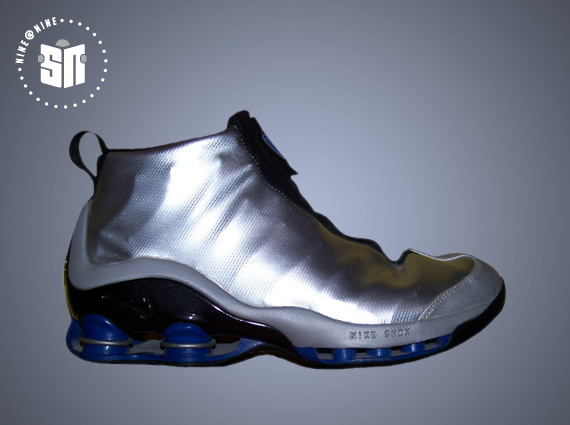
2002 – Nike Shox VC
Was Vince Carter the best dunker in the history of the NBA? The 2000 NBA Dunk Contest set the tone for the debate, and Nike jumped at the opportunity to snatch Vince up from AND1. In February he turned heads with an array of some of the best slams in the most memorable Dunk-fest to date in the AND1 Tai Chi, but by August of the same year he was making Frederic Weis famous for all of the wrong reasons in the Summer Olympics while wearing the Nike Shox BB4. With a $30 million new contract from the Swoosh they made sure his first signature was a head-turner, introducing the zip-up upper in the infamous Dr. Funk campaign that placed VC in a sepia-tinted 70s Rucker Park battle to truly show how futuristic this Shox pair was. We’d love to see him bring a pair back as a member of the Mavericks.
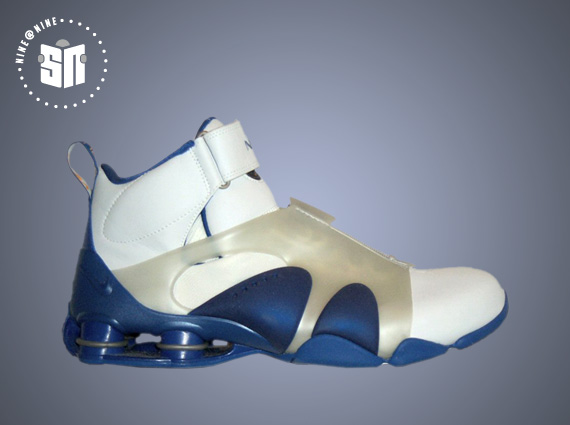
2002 – Nike Shox Stunner
The Nike Shox Stunner could just hold the title as the most farfetched design out of any of a Nike Shox basketball release, as an initial look at this model is enough to make one maul over its numerous inspirations. Boasting the same Shox plate from the BB4, the shoe featured a high-top ankle strap, a skeletal-like support system, and finished things off with a connecting zipper. Nike Basketball was currently caught up in the streetball phase of Summer hoops, forced to compete with a hungry AND1 brand that forced the Swoosh’s hand to create Nike Battlegrounds. And while looking back at the aggressive “Ball or Fall” campaign enclosed in a caged basketball court might seem like a funny bit of nostalgia today, Nike was muscling its way back to basketball dominance and this was just the early stages of a takeover.
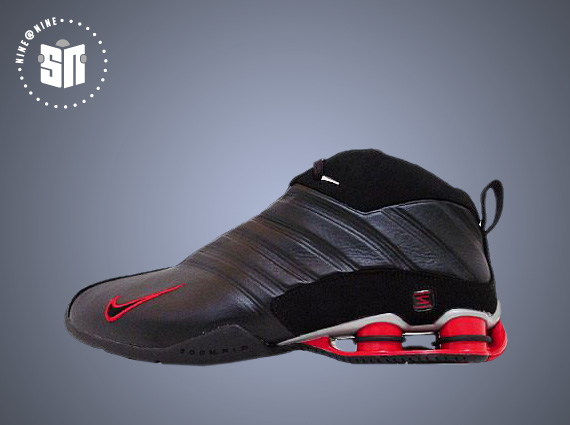
2003 – Nike Shox Supremacy
Perhaps one of the most promising things about the Nike Shox Supremacy was the idea of pairing Vince Carter and Richard Jefferson in the infamous Dunk Off commercial. It’s hard to imagine now, but there was a point where Jefferson was just as promising a high-flyer as Carter was, and the two battled it on-screen months before Vince would join the swingman in New Jersey. The silhouette featured a leather base, but cut things into nearly a low top (which was one of the qualms people had when playing in the sneaker). It serves as a reminder of what could’ve been in New Jersey if the two athletes that carried this silhouette could’ve remained healthy enough to carry it to prominence.
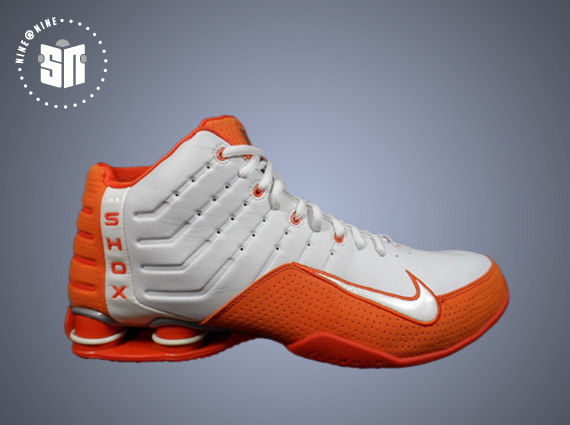
2005 – Nike Shox Elevate
The Nike Shox Elevate carried on the Shox basketball tradition as formidably as it could. The team shoe wave was in full effect with this model, as Nike had ended its search (at least momentarily) for a signature athlete to carry the imprint forward and instead focussed its attention on delivering a shoe that would appease a wider range of player. Featuring a synthetic leather upper with plenty of perforations for ventilation, the solid rubber outsole equipped with a herringbone pattern offerred maximum traction (that is if the High School gym you were probably playing on had been swept recently).
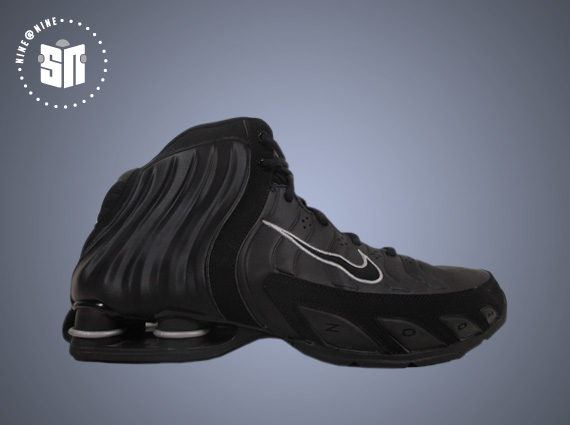
2005 – Nike Shox Lethal
2005 could’ve been the peak of Nike Shox technology right before the basketball imprint starting focussing its lens elsewhere. Two general release sneakers were big hits that year and could be found on the feet of seemingly every AAU and High School basketball squad in a 100-mile radius of a local sporting goods store. There was the aforementioned Nike Shox Elevate sure, but what about including a Foamposite ankle for a lightweight yet supportive ride? With a Zoom front transitioning and the usual Shox at the heel, this model arrived in any color combination imaginable.
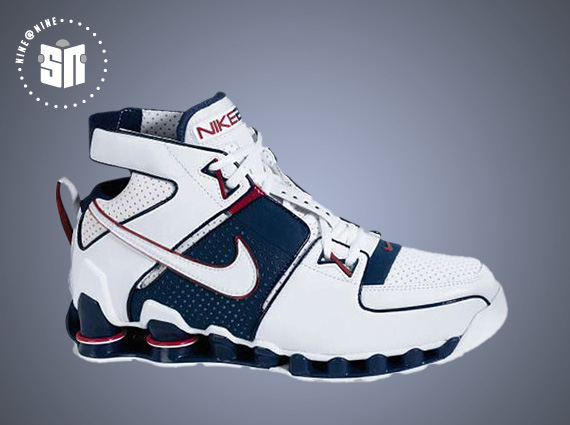
2005 – Nike Shox Bomber
The unofficial Jermaine O’Neal signature sneaker, pairs actually could be found in the clearance bins with a JO7 PE stitching in multiple Indiana Pacers colorways. It was an attempt to mix things up for the brand, but post-Malace at the Palace, things weren’t looking so hot for either the Pacers or Jermaine O’Neal. This shoe was actually a more than formidable on-court performer as a unique upper featured a high reaching collar and a synthetic base with plenty of perforations for a breathable, albiet bulky ride. The midsole featured 360 degrees of Shox technology, which was great for the wear and tear of being a big man in the NBA, but for the rest of the people buying this shoe, it may have been just a little prohibitive.
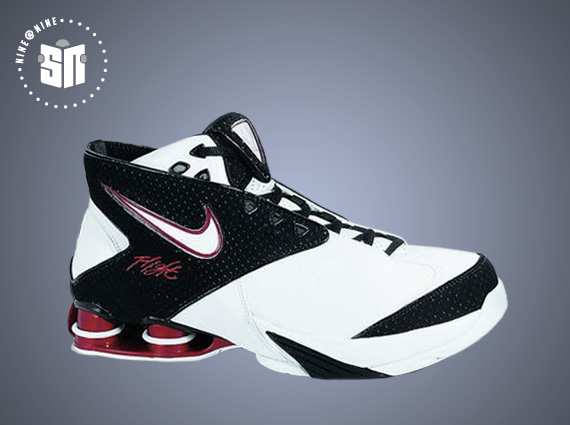
2006 – Nike Shox MTX
At the height of his career, Shawn Marion was a mesmerizing if not head-scratching talent. His jump shot defied all proper form and his lengthy frame made him an amble defender capable of averaging the same amount of steals as the league’s quicker, more apt guards. With Vince Carter’s signatures on the decline (his hold out in Toronto and subsequent years in New Jersey helped phase out his promising line) the time came for Nike to find a player to carry on the Shox tradition for their basketball imprint and they landed on Marion with the Nike Shox MTX. The Matrix featured an extended heel tab and perforated leather overlays but never quite caught on as it more or less signified the final echoes of the Shox basketball line. Now Marion spends his days holding down the second unit in Dallas with the man Nike wanted him to replace.
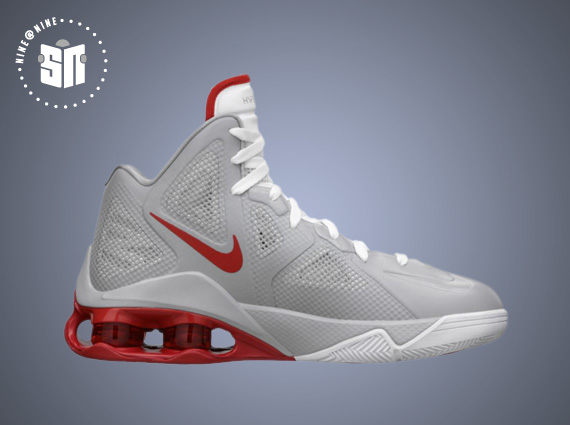
2011 – Nike Shox Hyperballer
The Nike Shox Hyperballer was a hyper shoe indeed, keeping things more than busy thanks to including a number of Nike innovations from the past and a few that would go on to define the Swoosh for the next couple of years. There was Zoom Air in the forefoot, a heel comprised of not only Nike Shox technology, but they jam-packed that with additional Air, all while the upper featured the lightweight hyperfuse material we’re so accustomed to today. You can still find this sneaker occasionally on the feet of Shawn Marion and Vince Carter, two players so familiar with the stylings of Shox technology that it’s almost like Nike was packing in whatever bounce they had left to elevate these guys at the tail end of their careers.


